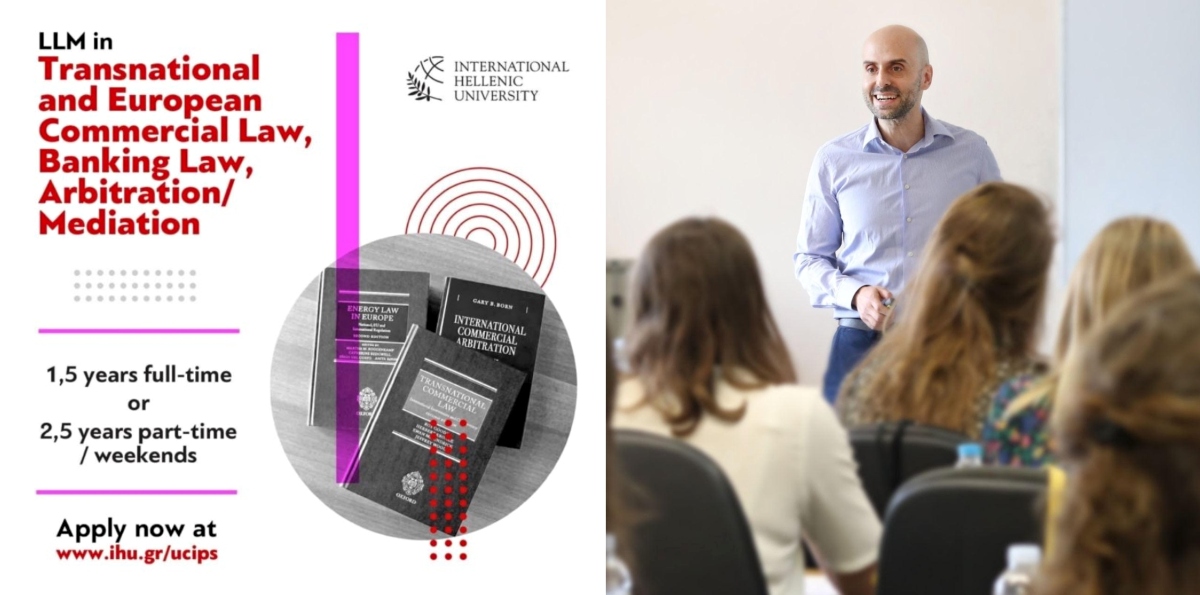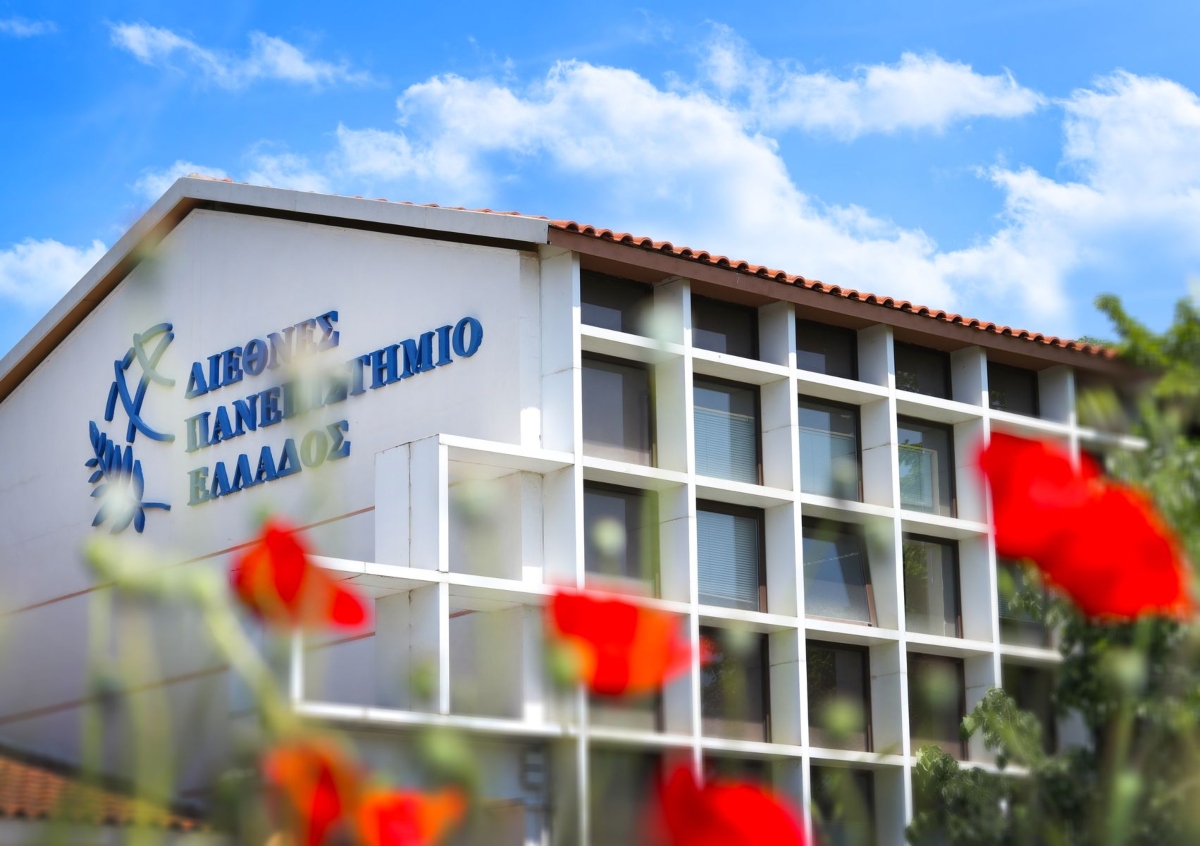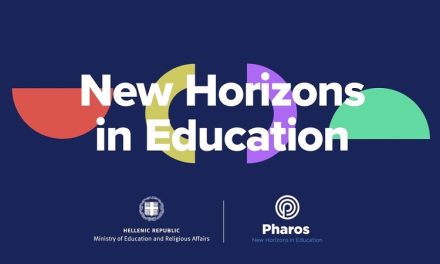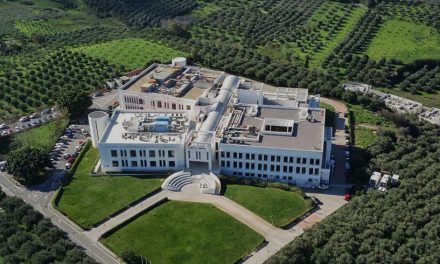The web portal Study in Greece is campaigning for the promotion and international visibility of Greek Universities and the comparative educational advantages of our country. In particular, the campaign focuses on the foreign language study programs that Greek Universities offer to Greek and international students. The initiative is supported by the General Secretariat of Higher Education of the Ministry of Education and Religious Affairs and the General Secretariat for Greeks Abroad and Public Diplomacy of the Ministry for Foreign Affairs. In this context, a number of educational programs and actions are presented in detail on a regular basis, such as undergraduate and postgraduate programs, summer schools etc, to inform international students about the many foreign language options offered by Greek Universities.
Study in Greece interviewed Associate Professor Komninos Komnios, Scientific Director of the LLM in Transnational and European Commercial Law, Banking Law, Arbitration/Mediation offered at the International Hellenic University (ΙΗU) about the program, its features and what it has to offer to international students.
Komninos Komnios is Associate Professor in Evidence Law, Digital Technology & Alternative Dispute Resolution at the School of Humanities, Social Sciences and Economics of the International Hellenic University; he is an attorney at law, LL.M., an accredited mediator of the Hellenic Ministry of Justice, and a member of the board of the Hellenic Regulatory Authority for Energy. He has published a number of studies in the field of Energy Law and dispute resolution, as well as papers, books and articles in international magazines.
 Please describe to us in a few words the basic rationales as well as the teaching objectives of the LLM in Transnational and European Commercial Law, Banking Law, Arbitration/Mediation Program.
Please describe to us in a few words the basic rationales as well as the teaching objectives of the LLM in Transnational and European Commercial Law, Banking Law, Arbitration/Mediation Program.
As the Scientific Director of the LLM in Transnational and European Commercial Law, Banking Law, Arbitration/Mediation Program, I am thrilled to have the opportunity to share with you the fundamental rationales and teaching objectives of this program.
At its core, the program is designed to provide students with a deep and comprehensive understanding of the complex legal frameworks that govern commercial transactions and banking operations across borders in the European context. The program takes an interdisciplinary approach, combining elements of commercial law, banking law, and dispute resolution, to provide students with a well-rounded education that prepares them for a variety of legal careers.
One of the key rationales behind the program is the recognition that in today’s globalized world, businesses and financial institutions are increasingly operating across borders, and lawyers must be equipped to advise clients on the legal implications of these transactions. The program, therefore, focuses on providing students with a solid foundation in the principles of transnational commercial law and European banking law, including the relevant regulations, institutions, and case law.
In addition to this theoretical foundation, the program places a strong emphasis on practical skills, including dispute resolution techniques, negotiation skills, and alternative dispute resolution methods such as arbitration and mediation. Our goal is to equip students with the skills they need to effectively represent clients in complex commercial disputes and negotiate favorable outcomes.
 Overall, the teaching objectives of the LLM in Transnational and European Commercial Law, Banking Law, Arbitration/Mediation Program are twofold: first, to provide students with a deep and comprehensive understanding of the legal frameworks governing commercial transactions and banking operations across borders in the European context; and second, to equip students with the practical skills they need to effectively represent clients in complex commercial disputes and negotiate favorable outcomes.
Overall, the teaching objectives of the LLM in Transnational and European Commercial Law, Banking Law, Arbitration/Mediation Program are twofold: first, to provide students with a deep and comprehensive understanding of the legal frameworks governing commercial transactions and banking operations across borders in the European context; and second, to equip students with the practical skills they need to effectively represent clients in complex commercial disputes and negotiate favorable outcomes.
The LLM in Transnational and European Commercial Law, Banking Law, Arbitration/Mediation programme promotes learning and teaching characterized by a diversity of resources and teaching styles and techniques which recognize that the University operates in an ever-changing environment. Teaching and learning methods should assist the development of these skills by encouraging not merely the capacity for abstract reasoning but also the students’ capacities for independent and self-motivated learning, problem-solving skills, and some of the knowledge and skills which are common to employment in many fields.
We believe that by achieving these objectives, our graduates will be well-positioned to make a positive impact on the global legal community, and we are confident that they will be highly sought after by law firms, businesses, and other organizations.
 Given that we are in the application period, please tell us why an international student should choose this specific program.
Given that we are in the application period, please tell us why an international student should choose this specific program.
I strongly believe that this program offers international students a unique and unparalleled opportunity to advance their careers in the legal field.
First and foremost, the program provides students with a comprehensive education in the legal frameworks that govern commercial transactions and banking operations across borders in the European context. This is a highly relevant and in-demand area of expertise, as businesses and financial institutions are increasingly operating across borders, and lawyers must be equipped to advise clients on the legal implications of these transactions.
In addition, the program places a strong emphasis on practical skills, including dispute resolution techniques, negotiation skills, and alternative dispute resolution methods such as arbitration and mediation. This hands-on approach to learning will not only prepare students for a variety of legal careers, but also help them to develop the real-world skills and expertise that are highly valued by employers.
Another advantage of this program is its international focus. With students and faculty from around the world, the program provides a unique and diverse learning environment that exposes students to a variety of perspectives and approaches to legal practice. This not only enriches the educational experience, but also helps students to develop a global network of contacts and build their professional reputation on the international stage.
Finally, the program is taught by highly qualified and experienced faculty who are dedicated to providing students with a high-quality education. Our faculty members are recognized experts from Greece and abroad in their fields, and they bring a wealth of practical experience and academic expertise to the program. Thus, our students gain a genuinely international, multicultural perspective with a global focus. Besides, they have excellent opportunities for networking.
In conclusion, the LLM in Transnational and European Commercial Law, Banking Law, Arbitration/Mediation Program offers international students an unparalleled opportunity to gain a deep and comprehensive understanding of the legal frameworks that govern commercial transactions and banking operations across borders in the European context, as well as the practical skills and expertise that are highly valued by employers. Whether you are just starting your legal career or looking to advance to the next level, this program will provide you with the knowledge, skills, and network you need to succeed.
 How do you think Greece could attract more foreign language students?
How do you think Greece could attract more foreign language students?
Greece has a rich cultural heritage, a beautiful landscape, and a thriving education sector, making it an attractive destination for foreign students. However, there are several steps that Greece could take to attract even more students from around the world. First, Greece could enhance its higher education infrastructure. This could involve investing in the training and development of faculty, upgrading university facilities, and promoting academic programs and research opportunities for students. By improving the quality and accessibility of higher education, Greece could become a more attractive destination for students seeking a top-quality education. Second, Greece could promote itself as a destination for cultural exchange and learning. By highlighting its rich cultural heritage and promoting its vibrant arts and cultural scene, Greece could attract students who are interested in immersing themselves in the local culture and learning about the history and traditions of the country. Third, Greece could work to create more opportunities for students to study and work in the country. This could involve establishing partnerships with local businesses, offering internships and work placement programs, and facilitating the creation of study abroad programs that allow students to earn credits while studying in Greece. Fourth, Greece could leverage its status as a member of the European Union to attract more foreign students. By highlighting its excellent universities and research institutions, Greece could position itself as a hub of intellectual and cultural exchange, drawing students from around the world who are seeking a high-quality education and a unique cultural experience.
Moreover, I would suggest the following practical steps:
- Improve visa and residency procedures: Streamlining visa and residency procedures for foreign students can make Greece a more attractive destination. This could involve simplifying the application process, reducing processing times, and offering clear guidance to students on what they need to do to obtain a visa and study in Greece.
- Provide language support: Many foreign students who come to Greece may not speak Greek, so providing language support can help them feel more comfortable and confident during their stay. This could involve offering language classes, providing language resources, and creating a supportive community for international students.
- Promote student housing options: Finding affordable and comfortable housing can be a challenge for foreign students, so promoting and facilitating access to student housing can make Greece a more attractive destination. This could involve working with local landlords and property managers to offer affordable housing options, providing information on local neighborhoods, and creating a network of students who can share their housing experiences.
- Create cultural exchange opportunities: Encouraging cultural exchange can help foreign students feel more connected to the local community and help build cross-cultural understanding. This could involve hosting cultural events and festivals, organizing cultural trips and excursions, and fostering partnerships with local organizations that promote cultural exchange.
- Support international student organizations: Creating and supporting international student organizations can help foreign students feel more connected to each other and to the larger community. This could involve funding student groups, providing resources and support, and working with international student organizations to help them achieve their goals.
 How do you think this program will help graduates in the labor market? Which are the educational as well as professional opportunities for them?
How do you think this program will help graduates in the labor market? Which are the educational as well as professional opportunities for them?
The LLM in Transnational and European Commercial Law, Banking Law, and Arbitration/Mediation program can help graduates in the labor market in several ways:
- Improved legal knowledge: Graduates of the program will have a strong foundation in the areas of commercial law, banking law, and alternative dispute resolution, which are critical areas in the global business world. This knowledge will help them understand complex legal issues and provide valuable insights to their employers.
- In-depth understanding of contemporary industry issues: Graduates of the program will be able to appreciate the challenges facing international institutions after the global financial crisis. These skills will help them follow future legal developments and regulatory initiatives.
- Cross-cultural awareness: The program focuses on transnational and European commercial law, which means graduates will have exposure to different legal systems and cultural perspectives. This cross-cultural awareness can be valuable in a global marketplace where businesses increasingly operate across borders.
- Networking opportunities: The program provides opportunities for students to network with their peers and faculty, who come from a variety of backgrounds and countries. These networks can be valuable in helping graduates make professional connections and find job opportunities.
- Skill development: The program provides hands-on training in areas such as negotiation, mediation, and arbitration. These skills are highly valued in the legal and business communities and can be useful in a variety of careers.
- Career advancement: The programme offers a highly flexible qualification suitable for a wide range of career openings in many sectors. Graduates of the program will have the knowledge and skills needed to succeed in a variety of careers, including legal practice, government service, international organizations, and business. They may also be well positioned to pursue advanced degrees and academic positions.
 How do you believe that extroversion could help both the country and the local economy of Thessaloniki?
How do you believe that extroversion could help both the country and the local economy of Thessaloniki?
Extroversion in education can have a positive impact on both the country and the local economy of Thessaloniki. Here’s how:
- Attracting international students: By promoting Thessaloniki as a hub for educational excellence, the city can attract international students to study at its universities. This not only enriches the educational experience for all students, but it also brings in revenue from tuition and living expenses, which can boost the local economy.
- Fostering cultural exchange: Extroversion in education can help to foster cultural exchange between Thessaloniki and other cities and countries. This can lead to a better understanding of different cultures and a deeper appreciation for diversity, which can have a positive impact on the local community.
- Promoting research collaborations: By promoting Thessaloniki as a hub for cutting-edge research and innovation, the city can attract research collaborations with institutions from other countries. This can help to advance knowledge and create new technologies, which can benefit the local economy.
- Building partnerships: Extroversion can help to build partnerships between Thessaloniki and other cities and countries. These partnerships can lead to the exchange of ideas, knowledge, and best practices, which can have a positive impact on the local economy.
- Preparing students for the global economy: By providing students with an education that is both global and local, extroversion in education can help prepare them for success in the global economy. Graduates who have a strong understanding of different cultures and languages will be well-positioned to succeed in today’s increasingly interconnected world.
Extroversion in education provides students with a passport to the world. By exposing them to different cultures, languages, and ways of thinking, it prepares them to succeed in today’s increasingly interconnected world. Graduates who have a strong understanding of different cultures and languages will be well-positioned to succeed in a global economy that values diversity and inclusiveness.
 Tell us some things about the International Hellenic University, its spirit, its future plans, and its efforts to adapt to the contemporary scientific world.
Tell us some things about the International Hellenic University, its spirit, its future plans, and its efforts to adapt to the contemporary scientific world.
The International Hellenic University (IHU) is a dynamic, forward-thinking institution that is committed to providing a high-quality education in a supportive and innovative learning environment. The university has a strong focus on developing its students into well-rounded, global citizens who are equipped with the skills, knowledge, and confidence they need to succeed in the modern world.
At the heart of IHU’s spirit is a commitment to excellence. The university is constantly striving to improve its academic offerings, research programs, and student services, with the goal of providing a truly world-class education. IHU is known for its innovative teaching methods, cutting-edge research, and engaging campus life, which provides students with an enriching and supportive environment in which to learn and grow.
In terms of its future plans, IHU is focused on continuing to expand its reach and impact both nationally and internationally. The university is committed to establishing itself as a leader in higher education and a hub of innovation and research in Greece. To achieve this goal, IHU is investing in new technologies, establishing partnerships with leading institutions from around the world, and offering new and exciting academic programs that reflect the changing needs of the global community. Furthermore, IHU is dedicated to its objective to attract new students, whilst offering them highly demanded innovative, and competitive postgraduate programs. To fulfill its expectations, the University has corresponded to the recent challenges of getting higher education in remote mode. Thus, a plethora of postgraduate programs is now offered online.
In terms of adapting to the contemporary scientific world, IHU is taking a proactive approach. The university is closely monitoring the latest trends and innovations in its fields of study and is continuously updating its curricula and research programs to ensure that students receive the most current and relevant education. This focus on staying ahead of the curve helps to ensure that IHU graduates are equipped with the skills and knowledge they need to succeed in today’s fast-paced and rapidly changing world.
Note that the application period is active until 30/09/2023
Read also via Greek News Agenda: Study in Greece: Professors Maria Gavouneli and Photini Pazartzis on the LL.M. in International & European Law at NKUA














